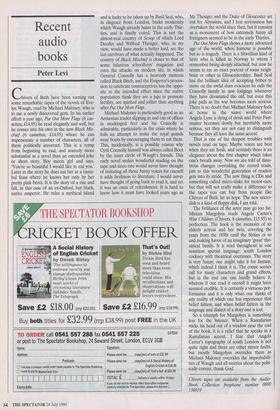Recent audio books
Peter Levi
shivers of Bath have been turning out some remarkable tapes of the novels of Eve- lyn Waugh, read by Michael Maloney, who is to me a newly discovered gem. In his earlier effort a year ago, Put Out More Flags (6 cas- settes, £14.95) he read elegantly and well, but he comes into his own in the new Black Mis- chief (6 cassettes, £14.95) where he can impersonate a number of characters, all of them politically incorrect. This is a romp from beginning to end, and scarcely more substantial as a novel than an extended joke or short story. Boy meets girl and says, `You're so beautiful I would like to eat you.' Later in the story he does eat her at a canni- bal feast where he knows her only by her pretty pink beret. It is the story of a rise and fall, in this case of an ex-Oxford, but black, native emperor. He rules a mythical island and is lucky to be taken up by Basil Seal, who, in disgrace from London, backs modernity which Waugh already hates in the early Thir- ties, and is finally outed. This is not the almost-real country of Scoop of which Lord Deedes and Wilfred Thesiger, who, in my view, would have made a better lord, are the last survivors of what actually happened. The country of Black Mischief is closer to that of some hilarious schoolboys' magazine and even the attacks on modern life, in which General Connolly has a heavenly mistress called Black Bitch, and the Emperor's proces- sion to celebrate contraceptives has the oppo- site to the intended effect since the native population think they are a juju to promote fertility, are spirited and jollier than anything after Put Out More Flags.
Michael Maloney is particularly good as an Armenian trader slipping in and out of offices in stockinged feet and his Connolly is admirable, particularly in the crisis where he foils an attempt to make the royal guards wear boots by encouraging them to eat them. This, incidentally, is a possible reason why Cyril Connolly himself was always called Boot by the inner circle of Waugh's friends. This early novel makes wonderful reading on the tape and since one would never have thought of imitating all those funny voices for oneself it adds liveliness to literature. I would never have thought of going back to read it, and yet it was an oasis of refreshment. It is hard to know how it must have looked years ago as Mr Thesiger and the Duke of Gloucester set out for Abyssinia, and I fear seriousness has overtaken the world since then, but it remains as a monument of how extremely funny all foreigners seemed to be in the early Thirties.
Put Out More Flags shows a more advanced age of the world, when humour is possible but so is tragedy. There is a Sitwellian kind of hero who is killed in Norway to whom I remember being deeply attached, but now he seems to me an exact portrait of some neigh- bour or other in Gloucestershire. Basil Seal has the brilliant idea of accepting bribes to move on the awful slum evacuees he calls the Connolly family to new lodgings whenever they have devastated the old, but even this joke palls as the war becomes more serious. There is no doubt that Michael Maloney feels at home in the suave world where Angela Lyne is dying of drink and Peter Past- master becomes slowly but inevitably more serious, yet they are not easy to distinguish because they all have the same accent.
That is one of the deepest troubles with novels read on tape. Maybe voices are best when they are fresh, and certainly there is an elegance about the first chapter which takes one's breath away. Now we are told of disas- trous changes overtaking the record trade, just as this wonderful generation of readers gets into its stride. The new thing is CDs and something called micro-disks for motor-cars, but that will not really make a difference to the tapes you can buy from people like Chivers of Bath, let us hope. The new micro- disk is a kind of floppy disk, I am told.
The brilliance of the actor may go too far. Miriam Margolyes reads Angela Carter's Wise Children (Chivers, 8 cassettes, £15.95) to perfection. The book is the memoirs of an elderly actress and her twin, covering the years from the 1890s until the Sixties or so and making havoc of an imaginary 'great' the- atrical family. It is read throughout in one seamless special language: south London cockney with theatrical overtones. The story is very funny, one might take it for fantasy, which indeed I think it is. The comic scenes call for many characters and grand effects, but in the end one can hardly believe it, whereas if one read it oneself it might have seemed credible. It is certainly a virtuoso per- formance and it is only when one thinks of any reality of which one has experience that belief falters, and when belief falters in the language and dialect of a story one is lost.
So a triumph for Margolyes is something less for the listener. When a Rastafarian sticks his head out of a window near the end of the book, it is a relief that he speaks in a Rastafarian accent. I fear that Angela Carter's topography of south London is not quite right and there are other minor faults, but mostly Margolyes overrides them as Michael Maloney overrides the improbabili- ties of Waugh and all worries about the polit- ically correct, thank God.
Chive's tapes are available from the Audio- Book Collection freephone number 0800 136919


























































 Previous page
Previous page